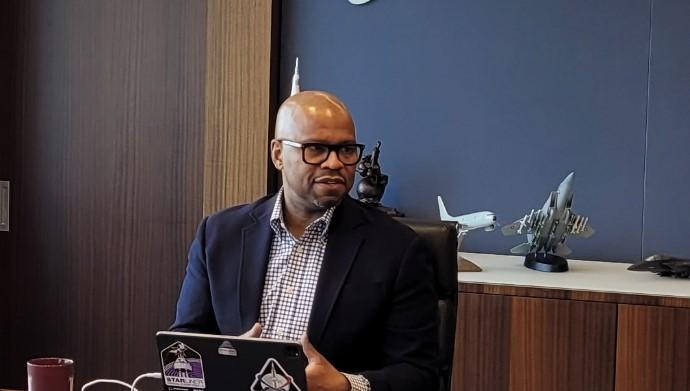
FARNBOROUGH—Pentagon officials over the past few years have repeatedly butted heads with Boeing on the acquisition of data rights over key programs, with the goal of cheaper sustainment in the long run.
It was an issue on the U.S. Air Force’s new MH-139 helicopter, and caused a delay on a contract for the U.S. Navy’s F/A-18. Boeing lost on the Air Force’s Survivable Airborne Operations Center (SAOC), in part because the service wanted extensive data rights, and it was a sticking point on recently closed negotiations on the E-7A Wedgetail.
Ted Colbert, president of Boeing Defense & Space, says his company is still evolving its approach to the issue of data rights on its programs. The goal is to hold on to enough intellectual property (IP) to ensure the company can profit while also providing its customers with what they need.
“We’re trying to create a template that we believe is executable across the programs in a way that’s reasonable to us and the customer,” Colbert said at the Farnborough Airshow on July 23. “So, this is an interesting one for me ... I don’t know if all the requirements for this are completely known yet.”
For example, with the F/A-18, a $1.3 billion contract for 17 Blk. III Super Hornets was held up because of a government request who some, including in Congress, argued was overreaching. The Navy, for its part, said getting IP was needed to maintain the fleet.
“The technical data package was a crucial part of this negotiation—it is necessary for naval aviation’s operational readiness and post-production sustainment,” Rear Adm. John Lemmon, program executive officer for tactical aircraft programs, said at the time.
Colbert says the company’s proposal for SAOC, to replace the current E-4B Nightwatch program, was unsuccessful because of government requests that were not acceptable from the company’s perspective. The program’s winner, Sierra Nevada Corp., intends to take an open approach with the government by largely handing over what IP it will generate.
The U.S. government and companies need to agree on a data rights approach that will respect a company’s need to protect its IP. This includes trying to understand if a customer’s goal is to maintain a program in perpetuity, create a new competition for sustainment or something else. This could include the government potentially not trusting that data will be provided at a difficult time, such as in a conflict.
“This will be a learning process,” he says. “I think we’ll figure it out over time.”
In the meantime, Colbert says he has told his company to ensure it remains competitive for sustainment.
“I challenged our team—if we’re worried about someone beating us in the aftermarket, we should be that good in the aftermarket so we never get beat,” he says.
